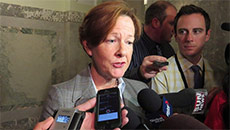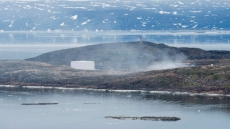ROCKY MOUNTAIN HOUSE, Alta. - The ground rumbled in Alberta on Saturday as the strongest earthquake the province has seen in over a decade hit an area west of Red Deer.
Natural Resources Canada reported the 4.3 magnitude quake happened at 9:28 local time near Rocky Mountain House.
It said there were no reports of damage, and that none would be expected from a quake that size.
Power was disrupted to about 500 customers, including a gas plant near Rocky Mountain House.
AltaLink spokesperson Scott Schreiner said a substation in the area locked out to prevent a surge or other damage on the system, and that power was restored about two hours later.
Keyara Corp., which operates the Strachan gas plant, said the facility flared off excess gas when it lost power, but there was no damage.
Julie Puddell, a spokesperson for Keyara, said the gas was flared as a safety measure. She said Alberta Environment was contacted for air quality monitoring.
Ted Hickey, the director of community and protective services for Clearwater County, said there was no risk to the public during the flaring.
Hickey said there were no reports of damage from the quake.
"There were some local reports of people feeling something, but they were pretty isolated," Hickey said, noting he didn't feel the earthquake at all.
Still, Honn Kao, an earthquakes seismologist with the Geological Survey of Canada, said there hasn't been an Alberta earthquake this big since a 4.0 quake shook an area northwest of Rocky Mountain House close to the B.C. boundary in 2001.

Kao said Alberta isn't especially well-known for earthquakes. There have been only two other small quakes in the province in the last 30 days, and they were a magnitude of 2 or 3.
While that may sound like plenty, he said B.C. has had hundreds in the same period, if offshore areas are included. On July 25, there was a 6.2 magnitude quake near B.C. off the coast of the Alaska Panhandle.
Alberta's earthquakes typically happen close to the Rocky Mountains, he said.
"This earthquake is a perfect reminder, especially for residents, that this area is active," Kao said.
"People should take this opportunity to make sure they are very well prepared for any earthquake in the future."
Kao said oil and gas activity hasn't been ruled out as a potential case for Saturday's earthquake, and that seismologists would be studying data to see if it may have been a factor. But he pointed out that the region where it occurred experienced quakes prior to energy development.
While a 4.0 quake wouldn't be enough to damage buildings, Kao said it could still cause shelves or glasses to fall and cause injury.
"If you don't have well-constructed buildings, even a magnitude 6.0 can cause fatalities," he said.





